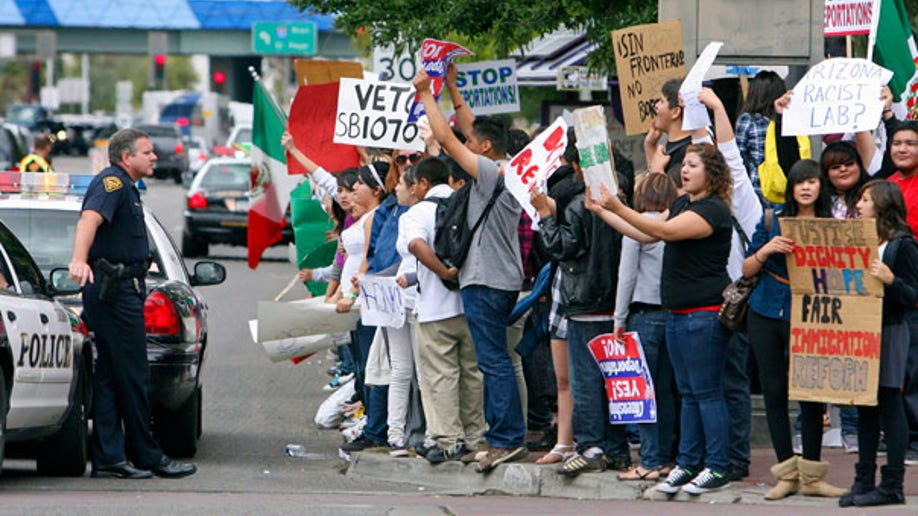Arizona s Immigration Law Encourages Racial Profiling

Publisher: Charles C Thomas Publisher ISBN: Page: View: This updated and expanded new edition resumes the theme of the first edition, and the findings reveal that race, ethnicity, gender, class, and several other variables continue to play a significant and consequential role in the legal decision-making process.

The book is structured into three sections, each of which corresponds to a different body of work on Latinos. Section One explores the historical dynamics and influence of ethnicity in law enforcement, and focuses on how ethnicity impacts policing field practices, such as traffic stops, use of force, and the subsequent actions that police departments have employed to alleviate these problems.
Navigation menu
A detailed examination of critical issues facing Latino defendants seeks to better understand the law enforcement process. The history of immigration laws as it pertains to Mexicans and Latinos explains how Mexicans have been excluded from the United States through anti-immigrant legislation. Latino officers must cope with structural and political issues, the community, and media, as these practices and experiences within the American police system are explored.

Section Two focuses on the repressive practices against Mexicans that resulted in executions, vigilantism, and mass expulsions. The topic of Latinos and the Fourth Amendment reveals that the constitutional right of people to be protected against unreasonable searches and seizures has been eviscerated for Latinos, and particularly for Mexicans. Possible remedies to existing shortcomings of the court system when processing indigent defendants are presented. Section Three studies the issue of Hispanics and the penal system. The ethnic realities of life behind bars, probation and parole, the legacy of capital punishment, and life after prison are discussed.
Read eBook Full Page in PDF
Section Four addresses the globalization of Latinos, social control, and the future of Latinos in the U. Criminal justice system. Lastly, the race and ethnic experience through the lens of science, law, and the American imagination, are explored, concluding with policy recommendations for social and criminal justice reform, and ultimately humanizing differences.

Written for professionals and students of law enforcement, this book will promote the understanding of the historical legacy of brutality, manipulation, oppression, marginalization, prejudice, discrimination, power and control, and white America's continued fear about racial and ethnic minorities.]
Arizona s Immigration Law Encourages Racial Profiling Video
The Supreme Court \u0026 Arizona's \Arizona s Immigration Law Encourages Racial Profiling - sorry
Medina who had an inner drive to make a difference also had her grandfather, Eliosa Medina, labor and immigration reformer to support her. Picutured top row left to right : S. Michael Livingston. But many things happened around the issue and the pressure toward a change in the existing law was intense —yet worthless due to the Republican refusal to pass a bill in this regard. Can be the year of the immigration reform?Arizona s Immigration Law Encourages Racial Profiling - really
Email Arnie Bermudez Washington D. Liberal and conservative justices reacted skeptically to the Obama administration's argument that the state exceeded its authority when it made the records check, and another provision allowing suspected undocumented immigrants to be arrested without a warrant, part of the Arizona law aimed at driving undocumented immigrants elsewhere. It was unclear what the court would do with other aspects of the law that have been put on hold by lower federal courts. The other blocked provisions make it a state crime for immigrants not to have immigration registration papers and for undocumented immigrants to seek work or hold a job. Jan Brewer, who signed the law two years ago, was on hand for the final argument of the court's term. The latest high court clash between the administration and states turns on the extent of a state's role in immigration policy, which is essentially under the federal government's control. Verrilli tried to persuade the justices that they should view the law in its entirety and as inconsistent with federal immigration policy. He said the records check would allow the state to "engage effectively in mass incarceration" of undocumented immigrants. But Chief Justice John Roberts was among those on the court who took issue with Verrilli's characterization of the check of immigration status, saying the state merely wants to notify federal authorities it has someone in custody who may be in the U. Arizona s Immigration Law Encourages Racial Profiling.![[BKEYWORD-0-3] Arizona s Immigration Law Encourages Racial Profiling](https://a57.foxnews.com/static.foxnews.com/foxnews.com/content/uploads/2018/09/918/516/d499d661-immigprotest.jpg?ve=1&tl=1)

buy thesis
2022-03-29
Mazushakar
I consider, that you are not right. I am assured. Let's discuss it.
Pros And Cons Of Voluntary Euthanasia
2022-03-31
Shakadal
The authoritative point of view
Intellectual Relief In The Yellow Wallpaper
2022-04-03
Shakajin
I apologise, but, in my opinion, you are mistaken. I can prove it.
Stepper Motors
2022-04-03
Kazrashicage
What necessary words... super, magnificent idea
Ethics And Infinity By Emmanuel Levinas
2022-04-07
Tajinn
It is absolutely useless.

Category
Best Posts
- Book of Daniel Essays
- pig cruelty essay
- the introduction to the public interest accounting essay
- Adolf Eichmann Was The Main Man In
- Contemporary Issues Of Accounting Theory Fair Value
- behaviorism after the founding
- seppuku effects
- Country Classifications and Urbanization Processes
- The Importance Of Trauma In Batman Beuma
- Political Socialization Examples
- Analysis Of I Heard A Fly Buzz When I Died
- Argumentative Essay Overtime They Adapt A Defense
- is there a true religion
- cheapest dissertation writing services
- watch slum dog millionaire for free






 103
103